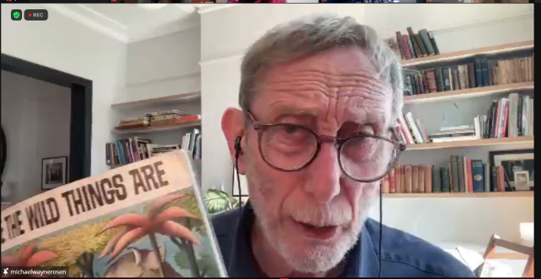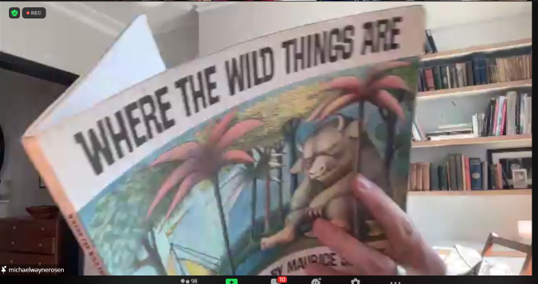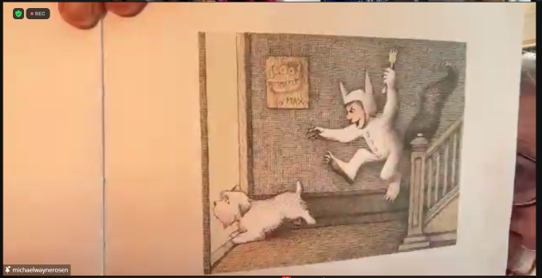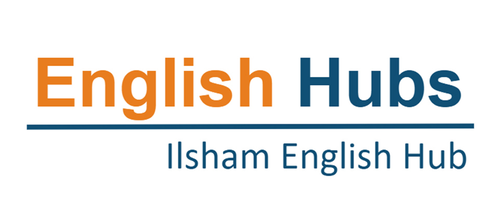|
Listening to celebrated poet, children's author, presenter and former Children's Laureate, Michael Rosen makes me wish I were a primary school teacher, a Secondary Teacher of English – or even better perhaps…a child hiding in a corner with a book, or looking forward to my bedtime story with a loved one. This Reading for Pleasure session introduced by Ilsham DfE National English Hub Lead, Danni Cooke, and Early Years and Phonics Specialist Leader of Education with the Learning Academy Partnership was always going to be a treat like reading a gripping good book. Michael’s credentials to talk on this lovely literacy topic are aplenty. A parent himself, actively working in schools leading workshops and as a writer in residence, television presenter, with a PHD in reading and writing and currently Professor of Children’s Literature at Goldsmiths, University of London in which a module studies and researches the best ways to approach children’s books in classrooms with a book of teachers’ projects due to be published in the autumn. Children benefit from “reading widely and often” beyond the classroom that can be seen in test results and attainment/achievement and ultimately, the years that children stay in education. Fact! We know it and believe it. But empirically, it is based on the esteemed longitudinal study, “Family Scholarly Culture and Educational Success: Books and Schooling in 27 nations,” by M.D.R. Evans, Jonathan Kelley, Joanna Sikorac and Donald J. Treimand from representative national samples across 27 nations, and with over 70,000 cases. “Children growing up in homes with books get three years more schooling than children from bookless homes, independent of their parents’ education, occupation, and class. This is as great an advantage as having university educated rather than unschooled parents, and twice the advantage of having a professional rather than an unskilled father.” In a lively storytime session, Michael read from Maurice Sendak’s 1960s children’s book, “Where the Wild Things Are” (cue lots of scary atmospheric pictures) as he skilfully guided the audience to see the story from a child’s eyes (and ears!), interpreting the words, pictures and concepts. And a new concept for me, this was part of Early Years and Year 1 pupils learning about the “interiority.” Engaging, thought-provoking and certainly reinforced the audience’s love of reading and the wish to share this love with children. In this value-added talk, so, to the takeaway tips and Michael Rosen’s Top Strategies to create a reading culture in schools – all of which are doable and dynamic, so without further ado... 1. Home School Liaison Mindful that some parents might not be literate, might have language difficulties, might have their own preconceptions of schools and teachers, there’s value in developing a home school culture. Set up a Home School Reading Committee to act as “Book Champions.” Organise bring and buy sales to encourage parents and pupils that sharing books is normal - and reach out to parents! 2. Hold Book and Reading Events Get everyone excited! Book sales. Book swaps. Second-hand bookshops. Enact book dramatisations and invite parents to watch and play out a story. 3. Appoint a School Librarian But what about sharing a School Librarian across a number of schools in a Trust or locally? 4. Share Information on Local Libraries Yes, we know the story about our national library service… Keep parents informed. Some might think they have to pay to use the library. Tell them they can borrow the books! 5. Set Up School Book Groups Let the School Book Group influence others with their reading ideas and discussions. 6. Adopt an Author or Illustrator Why not?! A win-win for the school and the author! 7. Making Books Dignify the making of books. Make the children the authors and celebrate the joy of books and reading. 8. Regular Activities Nourish activities with books. Think fiction poetry, music, guides to sites. 9. Show your Emotion about Special Books As teachers and staff, share books that mean so much to you. Bring in cherished books, talk about them and say why they are cherished. 10. Book Reviews To get started online, see: https://booksforkeeps.co.uk/ http://www.lovemybooks.co.uk/ https://www.lovereading.co.uk/ https://www.booksfortopics.com/ Print and pin-up in the classroom book reviews from newspapers and magazines AND of course, get children to write their own 11. Train Colleagues and Children on Children’s Literature Set up reading for pleasure groups and study children’s literature. 20 minutes after school. Booklovers always like an insight into a favourite author’s favourite books. You heard it here that Michael’s favourite books are “Emil and the Detectives” by Erich Kastner (for older children) and “Clown” by Quentin Blake (for younger), and in the realm of poetry, Wilfred Owen’s “Dulce and Decorum est” and “Down Behind the Dustbin” by Mr Michael Rosen no less. We thank Michael for his uplifting talk that makes reading for pleasure palpably so and to Ilsham English Hub for hosting this event. Watch out for the Goldsmiths, University of London “Children’s Literature in Action” free e-book due to be published in September. Report by Jude Owens, PA to the Executive SWIFT Team For more information and inspiration from Michael see his YouTube channel: More RFP CPD from Ilsham English Hub Ilsham English Hub are providing the following FREE TO ACCESS Reading for Pleasure offer of support for the next academic year: Teachers as Readers Group A Open University/UKLA evidence informed practice CPD. Open to all! There will be six informal, friendly and supportive sessions to help develop evidence informed practice, widening our knowledge of children's literature and other texts, enriching or Reading for Pleasure pedagogy and documenting the impact of children as readers. Session 1 | Wednesday 12 October 2022 Session 2 | Wednesday 23 November 2022 Session 3 | Wednesday 18 January 2023 Session 4 | Wednesday 15 March 2023 Session 5 | Wednesday 24 May 2023 Session 6 | Wednesday 21 June 2023 From 1600 to 1730 | Zoom There is an expectation that attendees try to attend all the sessions. Transforming your School Reading Culture (TSRC) Programme The TSRC programme is a sustained, research based CPD programme aimed at Primary English Leads. During the course of the programme participants will engage deeply with reading for pleasure pedagogy and leadership theory to transform their school’s reading culture. Participants will attend five sessions and complete gap tasks in between sessions: Core Session 1 | Wednesday 12 October 2022 | Reading for Pleasure: a whole school culture Core Session 2 | Wednesday 23 November 2022 | Creating whole school change Core Session 3 | Wednesday 18 January 2023 | Creating a reading school: structural changes Core Session 4 | Wednesday 15 March 2023 | Creating a reading school: behavioural changes Core Session 5 | Wednesday 21 June 2023 | Celebrating impact and sustaining change From 1230 to 1500 | Zoom There is an expectation that attendees try to attend all the sessions. The gap tasks will be related to developing participants’ own knowledge of children’s literature, understanding of reading for pleasure pedagogy and developing the reading for pleasure culture in their school. Audits
Work is underway for Autumn Term audits where Ilsham English Hub might be able to help your school with further personalised support and access to funding. For more information contact Ilsham DfE National English Hub Lead, Danni Cooke.
0 Comments
Your comment will be posted after it is approved.
Leave a Reply. |
SWIFT News
|
SPONSORED BY
Join us, be a part of our SWIFT community |
© COPYRIGHT 2022 SOUTH WEST INSTITUTE FOR TEACHING SWIFT. ALL RIGHTS RESERVED | Website by brightblueC
VIEW OUR PRIVACY NOTICES | VIEW OUR COURSE T&CS
VIEW OUR PRIVACY NOTICES | VIEW OUR COURSE T&CS





 RSS Feed
RSS Feed





